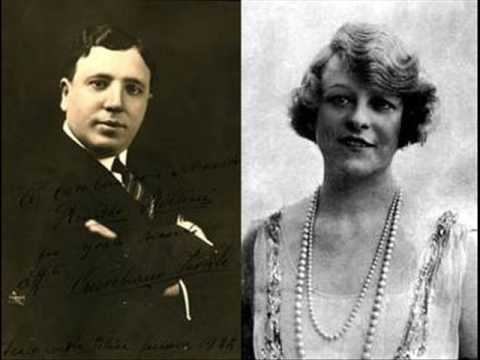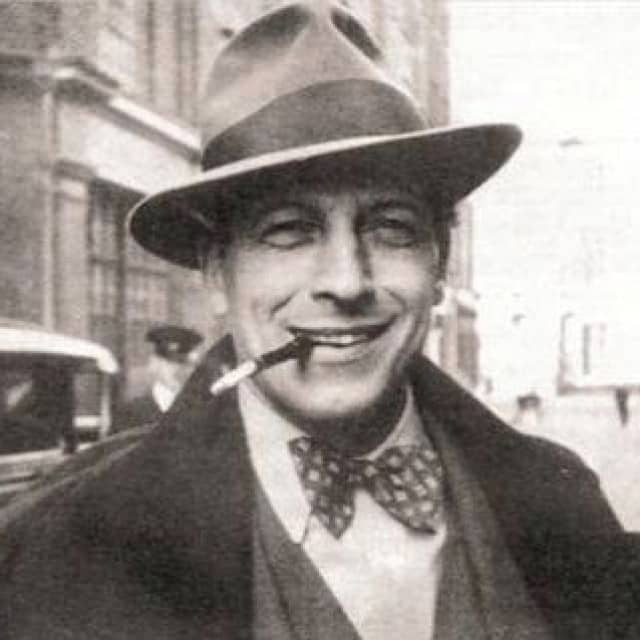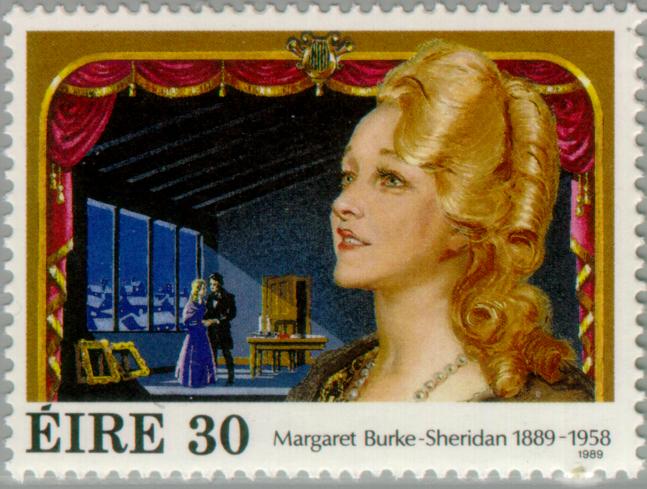|
SATURDEE OPRY LINKS 50:
Don't Forget Me Edition
Remembering. . .
  
Aureliano
Pertile
Margaret Burke-Sheridan
Ezio Pinza
Burke-Sheridan Irish stamp
Saturdee Opry Links Overture!
"Torquato Tasso," by Donizetti.
https://www.youtube.com/watch?v=NA_YK4KDWLg
1.
Some, perhaps many, moments in opera are best left untranslated. This might be
one, as the singing and music transcend the heavy, maudlin poetry of the
libretto. From "Andrea Chenier," by Umberto Giordano, this is the pre-guillotine
duet, "Vicino a te." The noble poet, Chenier, is being executed, mostly for his
hatred of the ruling class and his championing of those in need. At St. Lazare
Prison, his beloved, Maddalena, bribes the jailer to let her change places with
a condemned noblewoman, in order that she might die with Chenier. The lovers
sing about their love and their deliverance from this world after death. As dawn
approaches, Schmidt calls their names. They go to face the guillotine joined in
love. Nice little Valentine's Day scene!
Here is the great forgotten tenor, Aureliano Pertile, and forgotten Irish
soprano Margaret Burke Sheridan, in a terrific recording made 80 years ago.
https://www.youtube.com/watch?v=gsLafO4EGug
About Pertile:
http://archives.metoperafamily.org/Imgs/PertileTosca.htm
About Sheridan:
https://en.wikipedia.org/wiki/Margaret_Burke_Sheridan
Translation:
Next to you, my restless spirit becomes calm
You are the goal of every desire, of every dream,
of every poem
Within your glance
I see the iridescence of infinite spaces
I look at you,
In the green wave of your wide pupils
my soul wanders
So as not to leave you, I am here
This is not a goodbye!
I have come to die with you!
Suffering is ended!
Death in loving you!
Ah, the one who gathers the last word from
my lips is he---love!
You are the goal of my existence!
Ours is the love of twin souls
I am saving a mother
At dawn Maddalena will have the name
for death of Idia Legray. . .
Do you see? The uncertain light of twilight
already lowly lightens the squalid corridors
Embrace me! Kiss me, beloved!
You are the triumph of the soul
Your love, sublime beloved
is the sea, the sky, the light of the sun
and of the stars
It is the world
Beloved!
Our death is a triumph of love
Ah, I bless, I bless fate!
In the hour of our death we become immortal!
Infinity!Love!
Death comes with the sun, with the morning
Come like the dawn!
With the sun that gilds it!
It comes to us from the sky!
Long live death together!
2.
Margaret Burke Sheridan. . .She was "Maggie from Mayo," once one of the great
sopranos in the world, noted for Puccini roles at La Scala (under Toscanini,
close friend of Puccini) and Covent Garden, in the 19-teens. Vocal troubles
stopped her career short, and she retired in 1930. Or was it vocal troubles?
Sometimes they are closely tied to other matters. Brid McMahon's 1998 book,
"While Green Grass Grows," reports that "it was rumoured that an Italian whose
overtures she had rejected had blown his brains out in a box in La Scala, while
she was on stage, and that after the tragedy she never sang in public again."
Ms. Sheridan died in relative obscurity, having lived in Dublin for many years,
and her remains were buried in Glasnevin Cemetery, Dublin. Story worthy of, yes,
an opera. Here she is with the
setting of a Thomas Moore verse, "When He Who Adores Thee." Words are below the
video.
https://www.youtube.com/watch?v=LNeQT5B-O5I
3.
Puccini called Margaret Burke Sheridan the greatest "Madame Butterfly" to grace
the stage. Here she is with "Un Bel di Vedremo" or "One Fine Day," from the
opera.
Synopsis: Three years have passed since Butterfly's American husband left her to
return to the States. Her servant, Suzuki, tries to convince her that he isn't
coming back, but Butterfly won't have it. She sings of the day that her young
lieutenant will return. In this aria, she dreams of him sailing into the harbor
and climbing up the hill to meet her.
https://www.youtube.com/watch?v=U-yu-HIzaso
Translation:
http://www.aria-database.com/translations/butterfly01_unbel.txt
4.
Of all the tenors available to be signed by the Met after Caruso was stricken by
illness, Met GM Giulio Gatti-Casazza chose Aureliano Pertile. Not because
Pertile had the most beautiful tone, or the greatest power (no slouch, though he
was, in that area), but because, perhaps, he was simply unusual. As one critic
wrote, "His voice has a tendency toward whiteness, but in its fullest volume it
is warmer and resonant. He sang his music, He did not shout it, but delivered it
with free tones and smoothness." Someone else wrote that it was not a "golden
voice," but "firm and manly." "Whiteness" (as in tone color, not
ethnic background!). . ."golden voice". . .whatever the color, suffice to say that Pertile was one of a kind.
Here he is with the transporting, "Spirto Gentil," from Donizetti's "La Favorite" (today's SOL
overture.)
Synopsis: Not knowing that Léonore is the "favorite" of King Alphonse, young
Fernand asks the king for her hand in marriage and receives it---only because he
has led Castile to victory in battle over the Moors. Thinking that his bride is
pure, he prepares to marry her. However, before she appears, he finds out that
she has been the lover of the King! With his heart broken, he returns to the
monastery and mourns for the betrayal of his love and the loss of Léonore. Happy
Valentine's Day!
https://www.youtube.com/watch?v=Qoc5FPhJHZg&index=3&list=PLatSlUiE-3495yqN_7HRsNwmQNb2v1oNt
Translation:
http://www.lieder.net/lieder/get_text.html?TextId=23995
EXTRA!
The story of Pertile at the Met:
http://archives.metoperafamily.org/Imgs/PertileTosca.htm
5.
Pertile had a tremendous facility for dramatic singing. To hear him in this
agonizing scene from "Manon Lescaut" by Puccini makes that plenty clear. Yes, it is a
scene of pleading, but the pain of the character (Des Grieux), as evoked by
Pertile, is startling.
https://www.youtube.com/watch?v=n5YurcWdF_c&index=16&list=PLatSlUiE-3495yqN_7HRsNwmQNb2v1oNt
Synopsis: Le Havre, France, 18th century. Manon is to be deported to a prison in
Louisiana---as revenge by her spurned lover, Geronte. As she marches past with
other prisoners, on her way to board a ship, Des Grieux grabs her and says that
no one can take Manon away from him. When the captain of the ship comes to see
what the commotion is, Des Grieux begs for mercy and the captain agrees to take
him on the ship along with Manon. (Happy Valentine's Day!)
Translation:
http://operainenglish.blogspot.com/2013/03/no-no-pazzo-son-manon-lescaut.html
6.
Pertile had a kind of baritone-y tenor, which puts me in the mind of Jonas
Kaufmann. Let's compare them a little. I think you will find that while the
tonal quality of the voices is similar, that Kaufmann has a more contoured,
rich, resonant---and even darker---sound. While Pertile tends toward the
muscular, steely. Both are superb, in their way, though I find Pertile's more
affecting. You? Perhaps you disagree with my assessment. . .Here, first, is
Pertile with "Donna non vidi mai," a paean to a beautiful woman, from Puccini's
"Manon Lescaut."
https://www.youtube.com/watch?v=QNy2juT2ju8&list=RDQNy2juT2ju8
And here is Jonas Kaufmann in a concert performance, with the same aria:
https://www.youtube.com/watch?v=riT1rj55jjY&list=PL6Fpheo7_wHwhMR4KNw_VGkAHL0aF5kSQ
Setting: a square near the Paris gate, Amiens, France, 18th century
Synopsis: Des Grieux has just met Manon and fallen in love with her. Manon
leaves when called by her brother, but promises to return. Alone, Des Grieux
sings about his feelings for Manon.
Translation:
http://www.aria-database.com/search.php?individualAria=531
7.
Well, baritone-y tenors puts me in the mind of tenor-y baritones---that is,
baritones with great expressiveness, lyricism. This puts me in the mind of Ezio
Pinza. Right, "Mr. Some Enchanted Evening," who had a stellar operatic career
before he tongue-kissed Mary Martin in "South Pacific." (Really.) Here he is,
late in his opera days, pushing 60, with the bouncy rumination of planned
cunning, "La Calunnia," from Rossini's "Barber of Seville."
https://www.youtube.com/watch?v=GE4VzxMjC8A
Synopsis: Don Basilio, a music teacher, informs Dr. Bartolo that Almaviva is
Rosina's new lover. He suggests a plan to discredit him by calumny - vicious
gossip. Basilio describes the vast array of gossip that he can drag up and
amplify.
Translation of this wonderful passage:
https://turcanin.wordpress.com/translations/lyrics-translations/la-calunnia-english/
8.
And here is Mr. Pinza in his prime, with one you can hum to. (Well, got to
include at least one familiar item each Saturdee, eh?) Hum, yes, but don't spit on
the floor-ay. Here is Pinza in 1936, live on stage at the Met, with "Chanson du
Toreador" from "Carmen," by Bizet. Notice how he can be tempestuous, over the
top, nonchalant, lilting, all in one aria. Here is "Votre toast je peux vous le
rendre."
https://www.youtube.com/watch?v=HoqYOny3Aio
Synopsis: Escamillo, a great bullfighter, sings of his adventures in the
bullring.
Translation:
http://www.aria-database.com/translations/carmen03_toreador.txt
EXTRA!
Pinza on "What's My Line?"
https://www.youtube.com/watch?v=jtlk-I6Hz3c
9.
One more Pinza, plenty of pepperoni. Which is to say, here is a German Mozart
aria sung in Italian. This is a diabolical delight somewhat akin to "I'll Be
Glad When You're Dead, You Rascal You!" Here is "O wie will ich triumphieren,"
from Mozart's "Abduction From the Seraglio," in which Osmin sings of the joy he
will feel when all his enemies are hanged. (You will hear the Italiano "strangular"
sobe repeatedly.) I think we can all relate, especially in the era of Trump.
https://www.youtube.com/watch?v=2UPlXYv3lOk
Translation:
http://www.aria-database.com/translations/serail19_ha.txt
Annnnnnnnd. . .Louis Prima:
https://www.youtube.com/watch?v=fsWCZ_wXjHs
FINAL BOW:
We return to Maggie of Mayo, Margaret Burke Sheridan, singing "Danny Boy," based
on The Londonderry Aire. Get out the Kleenex.
About the song:
https://en.wikipedia.org/wiki/Londonderry_Air
https://www.youtube.com/watch?v=igkCEmRo5Ds
Saturdee Opry Links Encore!
Aureliano Pertile, the man who the Met chose when Caruso fell ill, sings "E
Lucevan le Stelle," ("And the stars were shining"), from Puccini's "Tosca."
Again, note how Pertile imbues every note with such drama.
https://www.youtube.com/watch?v=QhGaefxWux8
Setting: The ramparts of a fortress
Synopsis: Cavaradossi trades his last possession, a ring, to get a guard to take
a letter to the imprisoned Tosca. As he writes the letter, he sings of his love
for Tosca and for life.
Translation:
http://www.aria-database.com/search.php?individualAria=305
Saturdee Opry Links Second Encore!
It's overcast in L.A., a rare thing, but spring is just weeks away.
The great Aureliano Pertile. "What a wonderful thing is a sunny day!"
https://www.youtube.com/watch?v=AAgcCdT6h40
Translation:
https://en.wikipedia.org/wiki/%E2%80%99O_sole_mio
Back to Opera Links
Back to Home Page
|



